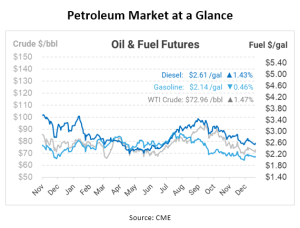
California Mandates Disclosures for Businesses Using Carbon Offsets
Is your business using carbon offsets to achieve your sustainability goals? If so, you may be impacted by California’s new disclosure requirement. California’s Assembly Bill No. 1305 Chapter 365, passed on October 7, 2023, is a law that aims to increase transparency and accountability in the voluntary carbon market. Effective Jan 1, 2024, the law requires businesses that buy or sell voluntary carbon offsets to disclose certain information about the carbon offset projects and the claims they make regarding their emissions.
Any voluntary carbon offset buyer conducting business in California is impacted – whether you’re a local California construction crew or a multinational data center operator. If your business is utilizing voluntary carbon credits, you must disclose key information on your company website. The penalty for non-disclosure is up to $2,500/day, with a maximum fine reaching as large as $500,000.
What Is a Voluntary Carbon Offset?
A voluntary carbon offset is a reduction or removal of greenhouse gas emissions that is not mandated by law but is done voluntarily by individuals or organizations to compensate for their own emissions or to achieve net-zero or other environmental goals. Voluntary carbon offsets are usually generated by projects that involve activities such as planting trees, capturing methane from landfills, or installing renewable energy sources.
Why Disclose This Information?
The law intends to provide consumers, investors, regulators, and the public with more information and confidence about the voluntary carbon market and its environmental and social impacts. The law also aims to prevent fraud, greenwashing, and double counting of voluntary carbon offsets, and to ensure that the voluntary carbon market complements and does not undermine the mandatory emission reduction programs in California and elsewhere.
What Carbon Offset Buyers Must Report
Effective Jan 1, 2024, the law mandates that a purchaser of voluntary carbon offsets that makes claims regarding the achievement of net-zero emissions or other similar claims must disclose on its website the following information:
- The quantity and type of offsets purchased
- The source and project details of the offsets purchased
- The time period and scope of the emissions covered by the offsets
- The methodology and assumptions used to calculate the emissions and the offsets
- The verification and validation processes that the offsets undergo
- The registry or platform where the offsets are issued and tracked
- The details regarding the retirement of the offsets
The law imposes a civil penalty for each violation of these disclosure requirements, which can be assessed and recovered by the Attorney General or by a district attorney, county counsel, or city attorney in a court of competent jurisdiction. Buyers must update their disclosure annually.
If you’re not sure whether this provision applies to your business, it’s encouraged that you seek legal counsel to determine applicability. If your business does claim carbon benefits due to purchasing voluntary carbon offsets, you’ll need to work with the entity selling those offsets to obtain the required information so you can publish it online.
It’s worth noting that the requirement only applies to voluntary offsets – legally regulated carbon regimes such as LCFS credits are not included in the provision.
Selling Carbon Offsets
If your business sells carbon offsets, you may need to provide additional information online. The law mandates that a business entity that sells voluntary carbon offsets must disclose on its website the following information about the carbon offset project:
- The methodology used to estimate the emission reductions or removal benefits
- The location of the project site
- The project timeline and start date
- The type of project
- The standards or protocols that the project meets or follows
- The verification and validation processes that the project undergoes
- The registry or platform where the offsets are issued and tracked
- The details regarding the ownership, transfer, and retirement of the offsets
- The information regarding the co-benefits, risks, and safeguards of the project
- The details regarding the accountability and recourse mechanisms if the project fails to deliver the expected emission reductions or removal benefits

This article is part of Daily Market News & Insights
Tagged:
MARKET CONDITION REPORT - DISCLAIMER
The information contained herein is derived from sources believed to be reliable; however, this information is not guaranteed as to its accuracy or completeness. Furthermore, no responsibility is assumed for use of this material and no express or implied warranties or guarantees are made. This material and any view or comment expressed herein are provided for informational purposes only and should not be construed in any way as an inducement or recommendation to buy or sell products, commodity futures or options contracts.





